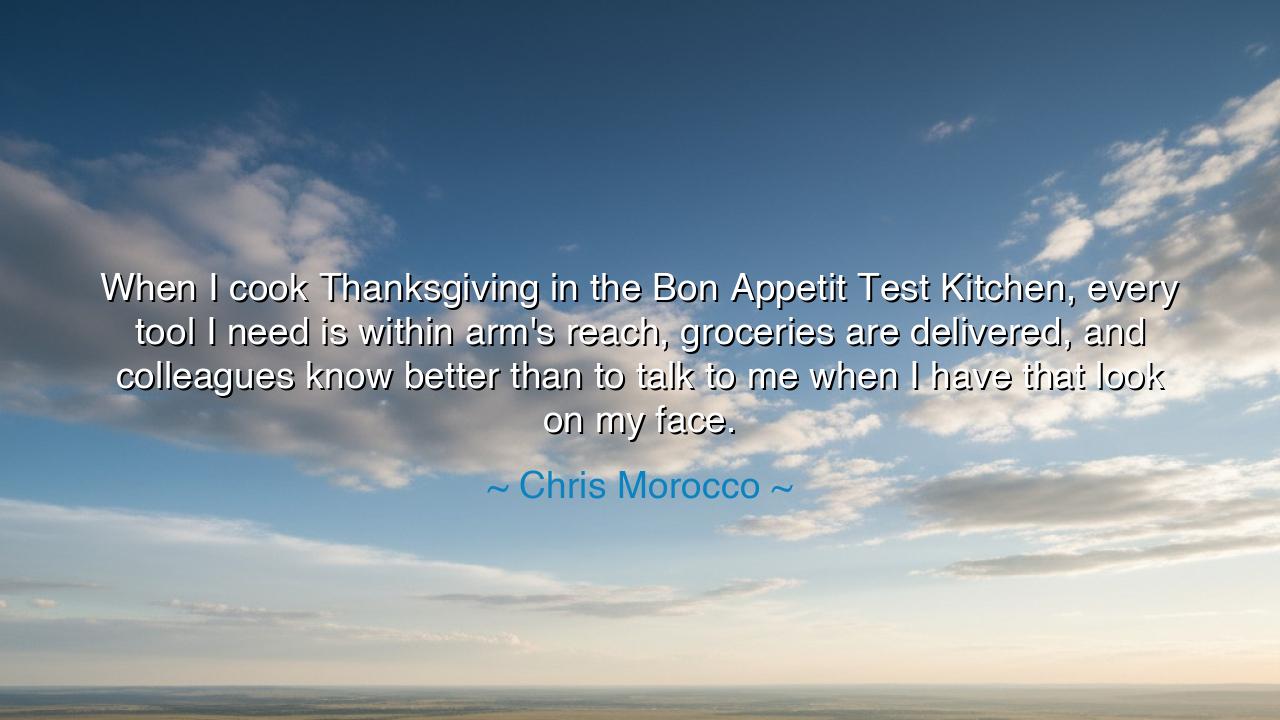
When I cook Thanksgiving in the Bon Appetit Test Kitchen, every
When I cook Thanksgiving in the Bon Appetit Test Kitchen, every tool I need is within arm's reach, groceries are delivered, and colleagues know better than to talk to me when I have that look on my face.






The words of Chris Morocco—“When I cook Thanksgiving in the Bon Appétit Test Kitchen, every tool I need is within arm's reach, groceries are delivered, and colleagues know better than to talk to me when I have that look on my face.”—speak to more than the art of cookery; they speak to the timeless discipline of preparation, focus, and reverence for ritual. Though wrapped in humor, they remind us that great undertakings, whether feasts or battles, require order, readiness, and concentration. The kitchen here is not only a place of food—it is a stage of creation, where chaos must be held at bay and precision must reign if the feast of Thanksgiving is to emerge in its full glory.
The ancients understood that to achieve greatness, tools and surroundings must be in harmony with the task at hand. A soldier did not march into battle with a broken sword, nor did a builder raise a temple without stone and chisel in place. Morocco’s insistence that “every tool I need is within arm’s reach” echoes the wisdom of ages: success favors the one who prepares. When the heart is set upon creation—be it a meal, a song, or a kingdom—there is no room for disorder, for distraction, or for lack of readiness.
History offers us luminous parallels. Consider Leonardo da Vinci, whose workshop was meticulously ordered, with brushes, pigments, and sketches laid carefully before him. In such a space, genius could flow unhindered, for chaos had been conquered before the work began. Likewise, the generals of Rome carried with them not only courage but also engineers, maps, and supplies, knowing that victory is won as much by preparation as by valor. Morocco’s kitchen, with its delivered groceries and well-placed tools, mirrors these timeless truths: creation is born not of chance, but of order.
Yet his words also reveal another truth: the power of focus. He speaks of colleagues who “know better than to talk to me when I have that look on my face.” This is not merely irritation; it is the fierce concentration of one who shoulders a sacred task. Just as an orator gathering his words before a crowd, or a priest tending the altar before the gods, the cook at Thanksgiving carries the weight of expectation, the honor of feeding others, the solemn joy of giving abundance to family or community. To break this concentration with idle chatter is to disrupt the sanctity of the moment.
The meaning runs deeper still. Thanksgiving is not only about food, but about gratitude, unity, and offering. In the Test Kitchen or the humble home, the cook becomes both servant and leader, guiding the family through ritual by the act of preparing the feast. The presence of order, the silence of respect, and the weight of responsibility all honor the sacredness of the day. Morocco’s words remind us that the cook stands at the center of the celebration, not to be distracted but to be supported, for their labor embodies love itself.
The lesson for us is this: treat sacred tasks with reverence. Whether you prepare a holiday meal, raise a child, or set your hand to work that will shape the lives of others, do not enter lightly. Gather your tools. Prepare your space. Focus your mind. Ask those around you to honor the moment with respect. In this way, your labor becomes not only effective, but noble. The smallest acts of preparation transform ordinary tasks into holy rituals.
Therefore, let your actions be these: practice readiness in all things. Keep your tools near, your space ordered, and your focus sharp. Honor the concentration of others when they work in their sacred calling. Approach your own tasks with the same spirit, treating each as if it were a feast you prepare for those you love. For in readiness, silence, and reverence, you will find that your work is no longer toil but offering.
Thus, Chris Morocco’s words, though spoken of kitchens and groceries, reveal an ancient truth: that creation requires order, focus, and respect. Let this be remembered for all time: the feast is not made only of food, but of the discipline and devotion of the one who prepares it. And in that discipline, the ordinary becomes extraordinary, and labor becomes love.






AAdministratorAdministrator
Welcome, honored guests. Please leave a comment, we will respond soon